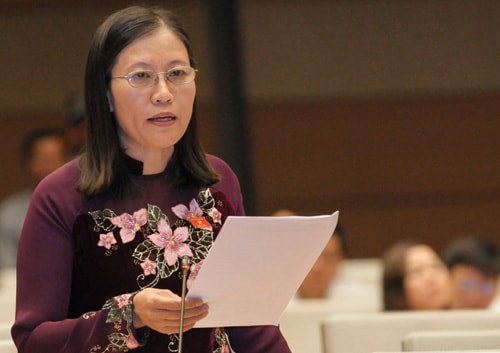People who have been sentenced to death will not be pardoned.
The National Assembly Standing Committee believes that people sentenced to death whose sentences have been commuted to life imprisonment should not continue to enjoy amnesty.
On November 7, at the discussion session on the Amnesty Law project (amended), Ms. Le Thi Nga, Chairwoman of the Judiciary Committee, said that the National Assembly Standing Committee proposed not to expand the amnesty subjects to people sentenced to death.
Specifically, the Standing Committee believes that, according to the provisions of the Penal Code, people sentenced to death are those who have committed especially serious crimes, infringing on national security, human life, drug crimes, corruption and a number of other especially serious crimes.
After being sentenced to death, implementing a lenient policy, the President decided to commute their death sentences to life imprisonment. According to the provisions of Articles 63 and 64 of the Penal Code, if they reform well, these cases will continue to receive other lenient policies such as: being reduced to a fixed-term prison sentence and may only have to serve 20 years in prison.
"Therefore, if the draft law stipulates amnesty for people sentenced to death, this group will enjoy too many lenient policies from the State, which will not ensure deterrence," Ms. Nga said.
|
Chairwoman of the Judiciary Committee Le Thi Nga. Photo:National Assembly Press Center. |
Regarding the conditions for proposed amnesty, delegate Vu Trong Kim said that authority should only be given to the Government in cases related to foreign affairs, while other cases have been submitted by the judiciary.
According to Mr. Kim, amnesty is a policy that reflects the nation's fine traditions, the Party and State's lenient policy, and is in line with the people's wishes, so it should be organized on major national holidays such as National Day, Lunar New Year, and April 30.
Chief Justice of Ninh Binh Provincial People's Court Mai Khanh said that there are currently regulations on major holidays, however, what constitutes a "major event" and "special case of foreign affairs" has not been explained, so it needs to be clarified in the draft Law.
Mr. Khanh emphasized that the timing of the amnesty and the President's authority to consider amnesty are different. The timing does not mean that there will be amnesty at that time, but rather that it will be decided by the President; in fact, this has been the case for many years.
According to the meeting agenda, the Amnesty Bill (amended) will be considered and approved by the National Assembly at the working session on the morning of November 20.



